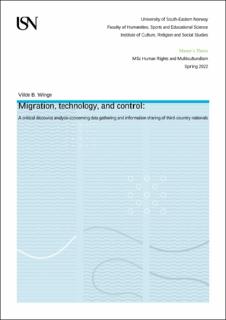Migration, technology, and control: A critical discourse analysis concerning data gathering and information sharing of third-country nationals
Master thesis
Permanent lenke
https://hdl.handle.net/11250/3011430Utgivelsesdato
2022Metadata
Vis full innførselSamlinger
Sammendrag
The use of technology in migration management and border control is not a new phenomenon. However, the use has grown enormously since 9/11 and the so-called “refugee crisis” of 2015/2016 in Europe; now, also, since the COVID-19 pandemic (Follis, 2017, 1004: Human Rights Council, 2021, 4: Lemberg-Pedersen and Haioty, 61, 2020). This thesis focuses on the technologies used by the EU to monitor their external borders and movements within the Union. Data gathering is particularly directed at third-country nationals and information sharing is used to stop irregular migration to Europe; as well as to facilitate returns. This practice has been criticized as it challenges migrants’ rights to seek asylum, their right to privacy and data protection as well as the non-refoulment principle (Human Rights Council, 2021, 5-6: UNGA, 1971). Therefore, a critical discourse analysis, inspired by Fairclough, has been applied in this thesis to expose the power relations that shape the discourses that legitimize the practice. As it will show, the EU has the power to bring forth ideological discourses of securitization and criminalization of migrants that allow the exclusion of irregular migrants and the potential violation of their rights to protect EU citizens’ trust and security. Cox’s theory on social forces, states, and worlds orders (1981) and the concept of hegemony are further used to understand in which structures the migration management regime is formed. Within these structures, social forces place the EU in a position to convince third-countries to cooperate based on the shared idea of a need to save migrants, as well as their material power to award and punish third-countries for their cooperation efforts (European Commission, 2016b, 9). The use of different technologies works to institutionalize an ideology that serves to protect the EU and its citizens from the perceived threat from the outside; throughout the Union and into third countries. As data gathering and monitoring of third-country nationals will serve to prove the existence of irregular migration, the technologies will work to materialize and legitimize their own perceived necessity.
